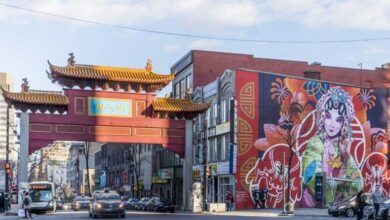Montreal, known for its vibrant urban landscape, has taken a unique and innovative approach to transforming its sidewalks into urban oases. Through a free borough-run program, residents are given the opportunity to adopt sidewalk tree plantings and create sidewalk gardens. This initiative has proven to provide numerous benefits for both the residents and the city as a whole, making Montreal a shining example of how urban greening can have a transformative impact on the environment, health, and social fabric of a city.
Enhancing the Urban Environment
One of the primary benefits of the Montreal program is the enhancement of the urban environment. By allowing residents to plant sidewalk gardens, the city is transformed into a greener and more aesthetically pleasing space. These gardens add a touch of nature to the concrete jungle, creating a more inviting and enjoyable atmosphere for both residents and visitors alike.
The program has been remarkably successful in transforming the city’s urban landscape. According to a report by the Montreal Gazette, the program has led to the creation of over 6,000 sidewalk gardens across the city. This has resulted in a significant increase in green spaces, contributing to a more beautiful and welcoming environment for everyone in the city.
Improving Air Quality
Sidewalk gardens play a crucial role in improving air quality. The plants and trees in these gardens act as natural air filters, absorbing pollutants and releasing oxygen. By increasing the number of green spaces in the city, Montreal can combat air pollution and create a healthier environment for its residents.
The University of Montreal conducted a study that found the presence of green spaces in urban areas can reduce air pollution by up to 30%. This is due to the ability of plants to absorb pollutants such as nitrogen dioxide and carbon monoxide. By actively planting sidewalk gardens, Montreal is taking a proactive approach to improving air quality and promoting the well-being of its citizens.
Mitigating Urban Heat Island Effect
Urban areas often experience higher temperatures due to the urban heat island effect, where concrete and asphalt absorb and radiate heat. Sidewalk gardens help mitigate this effect by providing shade and cooling the surrounding area. The plants and trees in these gardens act as natural air conditioners, reducing the temperature and making the city more comfortable during hot summer months.
According to a study by the University of British Columbia, the presence of green spaces in urban areas can reduce temperatures by up to 5 degrees Celsius. This cooling effect not only enhances the comfort of residents but also contributes to energy savings by reducing the need for air conditioning in buildings. By planting sidewalk gardens, Montreal is taking a proactive approach to mitigating the urban heat island effect and creating a more sustainable and livable city.
Promoting Biodiversity
Sidewalk gardens also contribute to the promotion of biodiversity in urban areas. By introducing a variety of plant species, these gardens create habitats for birds, insects, and other wildlife. This helps to maintain a healthy ecosystem and supports the overall biodiversity of the city.
According to a report by the David Suzuki Foundation, urban areas are home to a surprising amount of biodiversity. By creating green spaces such as sidewalk gardens, cities can support this biodiversity and create a healthier environment for both humans and wildlife. These gardens act as corridors for wildlife, allowing them to move through the city and establish new habitats.
Community Engagement and Social Cohesion
The Montreal program goes beyond the environmental benefits and also fosters community engagement and social cohesion. By allowing residents to adopt and care for sidewalk gardens, it encourages a sense of ownership and pride in the neighborhood. Residents have the opportunity to connect with their neighbors, share gardening tips, and collaborate on beautifying their surroundings. This sense of community involvement strengthens social bonds and creates a more connected and vibrant neighborhood.
According to a report by the National Recreation and Park Association, green spaces such as parks and gardens can promote social cohesion and community engagement. By creating opportunities for residents to connect with each other and their surroundings, cities can create a more vibrant and connected community.
Economic Benefits
In addition to the environmental and social advantages, the Montreal program also brings economic benefits to the city. The presence of sidewalk gardens enhances property values and attracts potential homebuyers and businesses. It creates a more desirable living environment and contributes to the overall economic growth and development of the city.
According to a report by the Urban Land Institute, green spaces such as parks and gardens can increase property values by up to 20%. This is due to the increased desirability of living in a green and beautiful environment. By planting sidewalk gardens, Montreal is creating a more desirable living environment and contributing to the economic growth and development of the city.
The Role of Public-Private Partnerships
The success of the Montreal program can also be attributed to effective public-private partnerships. While the program is borough-run and government-funded, it actively involves community groups, nonprofits, and businesses. These partnerships bring together resources, expertise, and volunteers to support the initiative’s expansion and maintenance.
Local businesses often provide sponsorships and donations for the procurement of plants, tools, and materials required for the sidewalk gardens. Additionally, community groups and nonprofits organize workshops and events to educate residents about gardening, sustainable practices, and the importance of urban green spaces. These collaborative efforts foster a sense of shared responsibility and ownership for the city’s public spaces, leading to a stronger and more resilient community.
Encouraging Sustainable Practices
The Montreal program not only promotes urban greening but also encourages sustainable gardening practices. Participants are provided with guidance on selecting native plant species that require minimal water and maintenance. By using native plants, residents can conserve water and reduce the need for chemical fertilizers and pesticides, thus minimizing their environmental impact.
Furthermore, the program educates residents about composting, rainwater harvesting, and organic gardening techniques. These sustainable practices not only benefit the individual gardens but also contribute to the city’s overall sustainability goals by reducing waste and conserving resources.
Addressing Urban Food Insecurity
Beyond beautification and environmental benefits, sidewalk gardens can also play a role in addressing urban food insecurity. Montreal’s program allows residents to grow fruits, vegetables, and herbs in their gardens, creating accessible sources of fresh produce for the community.
For lower-income neighborhoods with limited access to fresh food, sidewalk gardens can become a valuable resource for nutritious and locally grown produce. Community gardens, in particular, can be transformed into spaces where residents collectively grow and share food, fostering a stronger sense of community and addressing food inequity.
Empowering Communities
The Montreal program empowers communities to take an active role in shaping their neighborhoods. By involving residents in the creation and maintenance of sidewalk gardens, the program gives them a sense of agency and empowerment over their immediate environment. This approach promotes a more participatory and democratic urban planning process, ensuring that the city’s green spaces reflect the needs and preferences of its diverse population.
Challenges and Future Opportunities
While the Montreal program has achieved significant success, it also faces challenges that require careful consideration for the initiative to grow and thrive in the future. Some of these challenges include ensuring equitable distribution of sidewalk gardens across neighborhoods, addressing potential issues of garden maintenance and neglect, and providing ongoing support and resources for community engagement.
The program can benefit from expanding its educational initiatives, providing residents with ongoing workshops and resources to deepen their understanding of gardening, sustainability, and biodiversity. Moreover, incorporating educational programs in schools can cultivate an early appreciation for nature and green spaces among the younger generation, fostering a culture of environmental stewardship.
To sustain the program’s momentum and impact, Montreal can explore the possibility of integrating smart technologies
and data-driven solutions. For instance, sensors can monitor soil moisture levels, helping residents optimize their watering practices and conserve water. Data analytics can inform decision-making, enabling authorities to identify areas where sidewalk gardens can have the most significant impact on air quality, biodiversity, and social cohesion.
The Montreal program that allows residents to plant sidewalk gardens has demonstrated its effectiveness in enhancing the city’s urban environment, improving air quality, mitigating the urban heat island effect, promoting biodiversity, fostering community engagement, and providing economic benefits. By embracing nature in the midst of urbanization, Montreal is setting a commendable example for other cities to follow in creating greener and more sustainable urban spaces.
This initiative’s success lies in its ability to empower residents, create public-private partnerships, and foster a sense of collective responsibility for the city’s green spaces. While challenges exist, Montreal has the opportunity to continue expanding and refining its program, ensuring that it remains a cornerstone of the city’s efforts to create a healthier, more resilient, and inclusive urban landscape for generations to come. By working together, cities worldwide can learn from Montreal’s experience and create environments that promote the well-being of both people and the planet.



